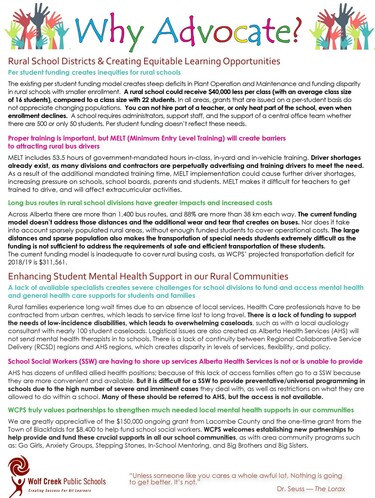Why Advocate?

Wolf Creek Public Schools’ Board of Trustees knows the importance of building relationships within our communities and across levels of government. Wolf Creek Public Schools’ Board of Trustees advocates for funding that ensures rural students have the same opportunities, levels of service, support and quality of learning as all Alberta students. WCPS’ Board of Trustees is pleased to share its Top Advocacy Priorities as we seek solutions to these challenges that face rural schools.
Rural School Districts & Creating Equitable Learning Opportunities
Per student funding creates inequities for rural schools
The existing per student funding model creates steep deficits in Plant Operation and Maintenance and funding disparity in rural schools with smaller enrollment. A rural school could receive $40,000 less per class (with an average class size of 16 students), compared to a class size with 22 students. In all areas, grants that are issued on a per-student basis do not appreciate changing populations. You can not hire part of a teacher, or only heat part of the school, even when enrollment declines. A school requires administrators, support staff, and the support of a central office team whether there are 500 or only 50 students. Per student funding doesn’t reflect these needs.
Proper training is important, but MELT (Minimum Entry Level Training) will create barriers to attracting rural bus drivers
MELT includes 53.5 hours of government-mandated hours in-class, in-yard and in-vehicle training. Driver shortages already exist, as many divisions and contractors are perpetually advertising and training drivers to meet the need. As a result of the additional mandated training time, MELT implementation could cause further driver shortages, increasing pressure on schools, school boards, parents and students. MELT makes it difficult for teachers to get trained to drive, and will affect extracurricular activities.
Long bus routes in rural school divisions have greater impacts and increased costs
Across Alberta there are more than 1,400 bus routes, and 88% are more than 38 km each way. The current funding model doesn’t address those distances and the additional wear and tear that creates on buses. Nor does it take into account sparsely populated rural areas, without enough funded students to cover operational costs. The large distances and sparse population also makes the transportation of special needs students extremely difficult as the funding is not sufficient to address the requirements of safe and efficient transportation of these students. The current funding model is inadequate to cover rural busing costs, as WCPS’ projected transportation deficit for 2018/19 is $311,561.
We bus 70 in-house urban and rural routes, eight (8) contracted rural routes, nine (9) contracted special education routes, for a total distance of 40,328 km.
Enhancing Student Mental Health Support in our Rural Communities
A lack of available specialists creates severe challenges for school divisions to fund and access mental health and general health care supports for students and families
Rural families experience long wait times due to an absence of local services. Health Care professionals have to be contracted from urban centres, which leads to service time lost to long travel. There is a lack of funding to support the needs of low-incidence disabilities, which leads to overwhelming caseloads, such as with a local audiology consultant with nearly 100 student caseloads. Logistical issues are also created as Alberta Health Services (AHS) will not send mental health therapists in to schools. There is a lack of continuity between Regional Collaborative Service Delivery (RCSD) regions and AHS regions, which creates disparity in levels of services, flexibility, and policy.
School Social Workers (SSW) are having to shore up services Alberta Health Services is not or is unable to provide
AHS has dozens of unfilled allied health positions; because of this lack of access families often go to a SSW because they are more convenient and available. But it is difficult for a SSW to provide preventative/universal programming in schools due to the high number of severe and imminent cases they deal with, as well as restrictions on what they are allowed to do within a school. Many of these should be referred to AHS, but the access is not available.
This year to date WCPS’ SSWs have made:
• 182 referrals to Alberta Health Services
• 160 referrals to community agencies
• 37 referrals to Children’s Services
WCPS truly values partnerships to strengthen much needed local mental health supports in our communities
We are greatly appreciative of the $150,000 ongoing grant from Lacombe County and the one-time grant from the Town of Blackfalds for $8,400 to help fund school social workers. WCPS welcomes establishing new partnerships to help provide and fund these crucial supports in all our school communities, as with area community programs such as: Go Girls, Anxiety Groups, Stepping Stones, In-School Mentoring, and Big Brothers and Big Sisters.
The total combined Inclusive Education deficit of the 25 members of the Rural Caucus of Alberta School Boards was more than $16.75 million in 2016/17.
Download the following advocacy documents:
